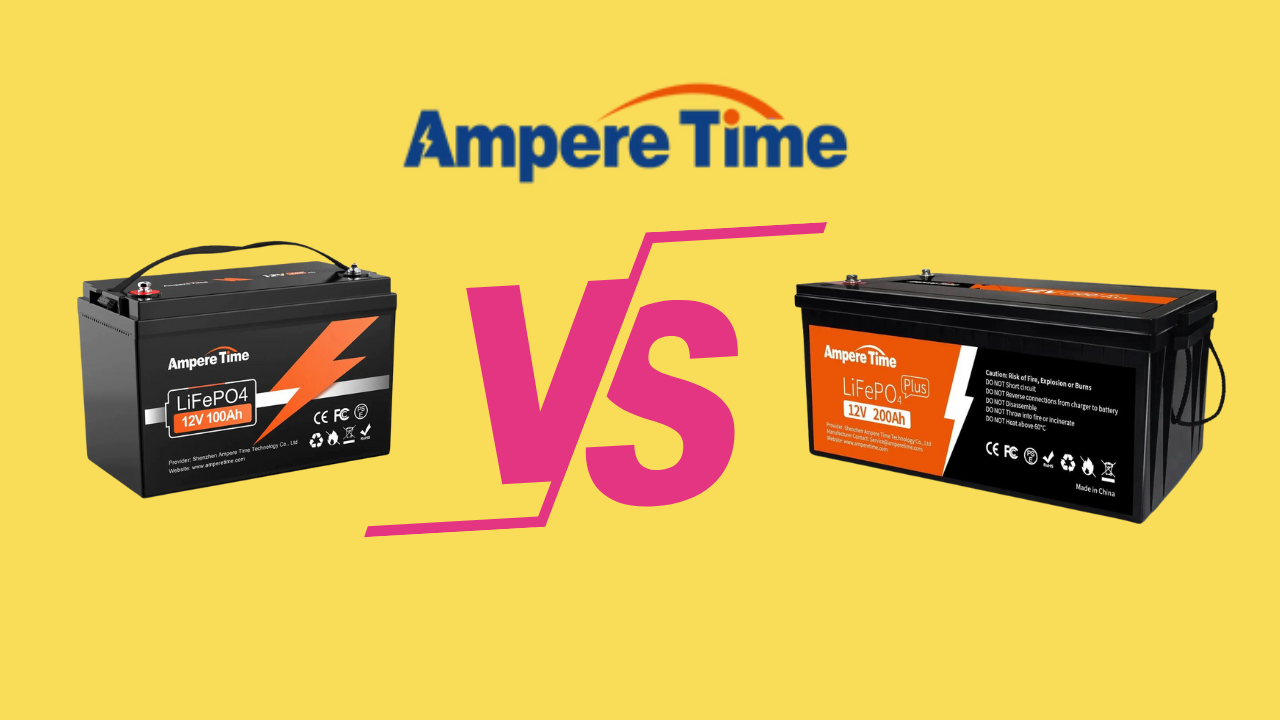In today’s fast-paced world, where electronic devices and portable power solutions are integral to our lives, having a reliable and efficient battery becomes crucial. Among the many brands in the market, Ampere Time has gained significant attention for its innovative LiFePO4 batteries. In this article, we will provide an in-depth review of Ampere Time’s LiFePO4 batteries, focusing on the 100Ah and 200Ah variants and addressing some common questions and misconceptions.
Understanding Ampere Time Batteries
Ampere Time is a renowned brand specializing in advanced Lithium and LiFePO4 battery solutions. These batteries are designed to deliver exceptional performance, longevity, and reliability for various applications, including recreational vehicles, boats, off-grid systems, and more. Ampere Time batteries are known for their high energy density, lightweight design, and consistent output voltage, making them popular among consumers looking for dependable power sources.
Traditional Lithium Battery
Lithium batteries are designed to offer an impressive energy-to-weight ratio, ensuring longer-lasting power in a compact form factor. The lithium batteries are well-suited for applications with high energy output and rapid charging capabilities. These batteries are known for providing consistent voltage levels throughout their discharge cycle, resulting in efficient power delivery.
Ampere Time LiFePO4 Battery
LiFePO4 (Lithium Iron Phosphate) batteries are renowned for their enhanced safety, stability, and longer cycle life compared to traditional lithium-ion batteries. Ampere Time’s LiFePO4 batteries maintain these advantages while offering impressive energy density and discharge capabilities. These batteries are ideal for applications where safety and longevity are critical factors, such as solar power storage and marine applications.
Ampere Time 100Ah Battery vs. 200Ah Review
This section will delve into a comparative analysis of Ampere Time’s 100Ah and 200Ah batteries, highlighting their differences, benefits, and best-use scenarios.
- Capacity
The most apparent distinction between the Ampere Time 100Ah and 200Ah batteries is their respective capacities. The 100Ah battery provides a capacity of 100 ampere-hours, making it suitable for applications that require moderate power consumption and storage. On the other hand, the 200Ah battery boasts a larger capacity of 200 ampere-hours, catering to devices and systems with higher power demands or the need for extended operation.
- Power Output and Discharge Rates
Given its larger capacity, the 200Ah battery can deliver higher power output and sustain higher discharge rates compared to the 100Ah counterpart. This makes the 200Ah battery more suitable for applications requiring rapid energy release, such as powering electric vehicles, backup power systems, and equipment with high starting currents.
- Physical Size and Weight
Naturally, the 200Ah battery’s increased capacity comes with a trade-off in terms of physical size and weight. The 200Ah battery is likely larger and heavier than the 100Ah battery, making it better suited for stationary or large-scale applications where size constraints are less of a concern.
- Longevity and Cycle Life
In general, larger-capacity batteries tend to have slightly shorter lifespans and cycle lives compared to smaller ones. This is due to the increased stress and wear on the battery’s internal components during charging and discharging cycles. Users should consider their specific usage scenarios and required lifespan when choosing between the two options.
- Use Cases
- 100Ah Battery: The 100Ah battery is ideal for applications where space and weight constraints are crucial and moderate power requirements suffice. Common use cases include camping setups, small-scale solar energy storage, marine applications, and backup power for smaller electronic devices.
- 200Ah Battery: The 200Ah battery shines in scenarios demanding higher power output and extended operational periods. It suits applications like large-scale solar installations, off-grid cabins, RVs, boats, electric forklifts, and backup power systems for homes or businesses.
- Cost Considerations
Typically, higher-capacity batteries come at a higher cost due to the larger amounts of materials required for manufacturing. Potential buyers should evaluate their budget and determine whether the increased capacity aligns with their intended usage and needs.
Frequently Asked Questions
Are Ampere Time batteries waterproof?
Ampere Time batteries are not inherently waterproof. However, some models have varying degrees of water resistance or protection. If waterproofing is a requirement for your application, it’s essential to check the product specifications and ratings provided by the manufacturer.
How long will a 100Ah battery last?
Drawing a constant 10-ampere current from a 100Ah battery would last 10 hours (100Ah / 10A = 10 hours). However, practical efficiency and factors like battery degradation might slightly reduce this time.
How long can you run a TV on a 100Ah battery?
The power consumption of the TV will determine how long it can run on a 100Ah battery. If your TV draws 50 watts, which is equivalent to 4.16 amperes at 12 volts, the battery could theoretically power the TV for approximately 24 hours (100Ah / 4.16A ≈ 24 hours).
Save on Your Purchase with Ampere Time Coupon!
For those planning to purchase an Ampere Time LiFePO4 battery, we have an exciting offer for you. By using our exclusive Ampere Time coupon code at checkout, you can enjoy significant savings on your battery purchase.
Whether you’re opting for the 100Ah or 200Ah battery, this coupon code provides you with a cost-effective way to enhance your power solutions. Don’t miss out on this opportunity to experience Ampere Time’s quality and performance while also enjoying extra savings.
Conclusion: Which Battery to Choose?
In the Ampere Time lineup, the choice between a 100Ah and a 200Ah battery hinges on the specific requirements of the intended application. While the 100Ah battery is more compact and suitable for moderate power needs, the 200Ah battery offers substantial power reserves for more energy-intensive applications. Both batteries offer quality performance, but the final decision should be based on the capacity demands, available space, and budget considerations of the user.

